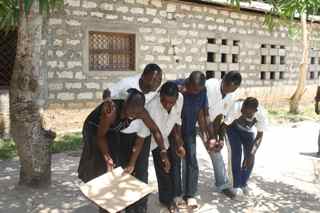On Friday the ASSETS program started camps for families receiving bursary funds. In the morning, parents and students from Gede primary school and Mijomboni primary school gathered in Mijomboni. This is where Festus, a community conservation officer, started off the day teaching the families about the history of A Rocha Kenya, shared the location of the eco-tourism sites that provide bursary funds and highlighted the importance of conservation in the surrounding area. After enjoying juice and cookies the parents left leaving the students for the rest of the day. A key part of the ASSETS program is to teach students about conservation. The afternoon was spent explaining the ecological importance of the Arabuko-Sokoke forest and Mida Creek. Students participated in games called, “Hungry Hippos,” and “The Wader Migration Game.” During “Hungry Hippos” students had to share limited resources with their friends and by doing so they were able to cross a river full of hippos. “The Wader Migration Game” involved the students learning about the challenges birds face while trying to migrate around the world. The day ended with the introduction of a brand new curriculum, called A Rocha Conservation Education Course for Secondary Schools (ACCESS), where students participate in a four year long environmental studies course outside the classroom. The students were very excited about the introduction of the new course and agreed to participate. The day was full of learning. Next week Festus and volunteers will continue to run camps for eight more schools supported by the ASSETS program.



